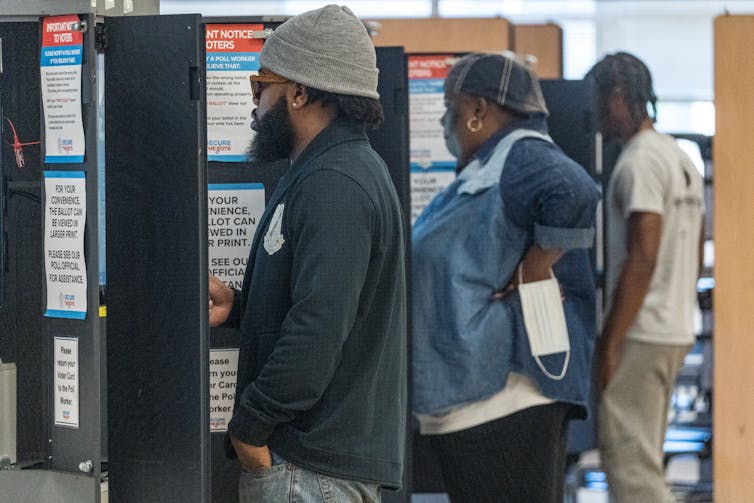A brief history of Georgia’s runoff voting – and how this year's contest between two Black men is a
Runoff elections in Georgia have a racist past, but the contest between Raphael Warnock and Herschel Walker for US Senate is a sign of progress.

In the U.S., all elections are administered by the states. But not all states use the same rules.
Georgia uses a version of runoff voting, which entails two rounds of voting. Typically, if a candidate wins more than 50% of the votes in the first round, that candidate is declared the winner. If not, the two candidates with the most first-round votes face off in a second round of voting.
There’s historically been concern that such a runoff system disadvantages Black candidates. Former Assistant U.S. Attorney General John R. Dunne once argued that Georgia’s runoff voting system has had “a demonstrably chilling effect on the ability of Blacks to become candidates for public office.”
U.S. Rep. James E. Clyburn of South Carolina similarly argues that runoff voting has “purposefully diluted Black votes” and has been successful at “keeping Black candidates from reaching elected office.”
Yet on Dec. 6, 2022, Georgians will vote in a runoff election between Democratic incumbent Raphael Warnock and Republican challenger Herschel Walker – both of whom are African American men.
So, is runoff voting racist? Or isn’t it?

A brief history of runoff voting in Georgia
In 1917, Georgia adopted the “county unit system,” which was a way of voting that operated similarly to the way the U.S. Electoral College works.
For presidential elections, each state is allocated a number of electoral votes based on the size of its congressional delegation, which in turn is partially based on its population. As such, more populous states have more electoral votes than less populous states.
Similarly, under Georgia’s county unit system, more populous counties were allocated more votes in statewide elections than less populous counties. Each county’s votes were then awarded to whoever won that particular county.
The Electoral College gives proportionately more power to less populous states. Similarly, the county unit system favored less populous counties, while more populous counties were underrepresented.
This was particularly harmful to the influence of African American voters, who largely lived in the more populous urban counties.
In 1963, the U.S. Supreme Court declared the county unit system unconstitutional, as it violated the standard of “one person, one vote.”
In response, Georgian legislators began looking for a new electoral system that could similarly, yet legally, suppress the African American vote. Later that year, Denmark Groover, a member of the Georgia House of Representatives, proposed the adoption of runoff voting, as it “would again provide protection which … was removed with the death of the county unit system.”
The most common voting system used in the U.S. is plurality voting, in which the winner of an election is the candidate who receives the most votes. A potential downside of this system is that, if a lot of candidates are running for one office and the vote is split several ways, the candidate with the highest number of votes may have a relatively low percentage of the overall vote, winning with a plurality, not a majority.
In 2016, for example, Donald Trump became U.S. president with only 46.1% of the popular vote, despite the fact that his main rival, Hillary Clinton, earned 48.2%.
The fear among many white Georgians was that if elections were left to plurality voting, the white vote could be split among several different candidates. If African Americans all voted for a Black candidate, that person could end up winning the election with the most votes overall, even if their winning percentage was relatively low.
To prevent this, Groover and his allies pushed for the adoption of runoff voting as an opportunity to “prevent the Negro bloc vote from controlling the elections.”
In 1964, Georgia lawmakers adopted Groover’s proposal.
Runoff voting is popular across the world
Runoff voting has been around for a while, and it has been used in a variety of contexts. Germany began experimenting with this type of voting in the late 1800s, after which it spread to Norway in 1906, and then France in 1928. Runoff voting was later adopted by several former French colonies after they obtained independence. After the collapse of the Soviet Union, several more newly independent countries decided to embrace the system.
Today, runoff voting is used in more than 40 countries across Asia, Africa, Europe and the Americas.
In addition to Georgia, several other U.S. states also use runoff voting in some capacity, including Alabama, Arkansas, Mississippi, North Carolina, Oklahoma, South Carolina, South Dakota, Texas and Vermont.
The top-two primary used in California, Nebraska and Washington, as well as Louisiana’s so-called “jungle primary,” are also variations of runoff voting.
Alaska, Maine and several cities around the country have recently adopted ranked choice voting. This system is sometimes referred to as “instant runoff voting,” because it too can be viewed as a type of runoff voting.
As a scholar of voting systems, I have found that runoff voting tends to produce better policies. This is because runoff elections often favor candidates who lean to the center, and center-leaning candidates seem to be more likely to respect human rights and provide better representation of a larger portion of the electorate.

A sign of progress
In a 1984 deposition, Groover candidly testified that he was “a segregationist” who “had many prejudices” and he didn’t “mind admitting it.” Although Groover was a racist, and although he pushed for runoff voting in Georgia for racist reasons, this does not mean that runoff voting as a system is inherently racist.
Rather, it shows how people can be racist.
If preventing a minority candidate from winning is the primary concern for a majority of voters, then runoff voting will prevent minority candidates from winning.
Before Warnock’s historic victory in 2021, Georgia had elected not a single African American U.S. senator, governor, lieutenant governor or secretary of state in either a runoff or a general election.
The fact that Warnock is now facing off against Walker, another African American man, suggests that preventing a minority candidate from winning is no longer the primary concern for a majority of Georgian voters. Rather than race, it seems that other concerns now guide most Georgians’ voting.
In a sense, regardless of who wins, Georgians can be proud that the state seems to be taking a small step toward a future in which the content of one’s character matters more than the color of one’s skin – and one in which a voting method originally passed to bar Black people from public office seems now to have failed in its goal.
Editor’s note: This story incorporates material from an earlier story published on Nov. 23, 2020.
Joshua Holzer does not work for, consult, own shares in or receive funding from any company or organization that would benefit from this article, and has disclosed no relevant affiliations beyond their academic appointment.
Read These Next
Why US third parties perform best in the Northeast
Many Americans are unhappy with the two major parties but seldom support alternatives. New England is…
Abortion laws show that public policy doesn’t always line up with public opinion
Polls indicate majority support for abortion rights in most states, but laws differ greatly between…
Detroit was once home to 18 Black-led hospitals – here’s how to understand their rise and fall
In the early 20th century, Detroit’s Black medical professionals created a network of health care…






